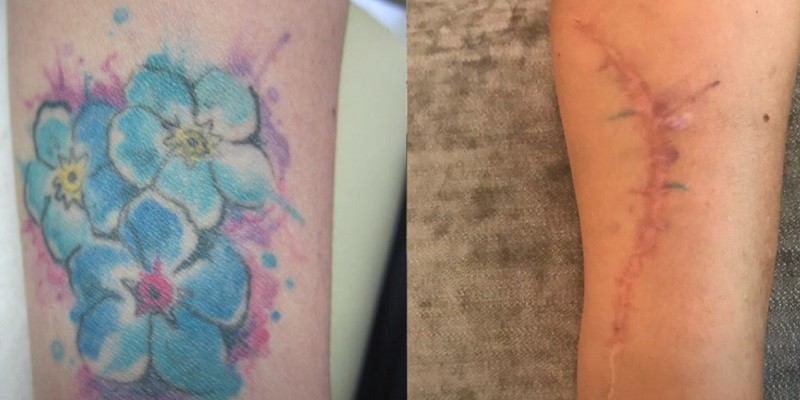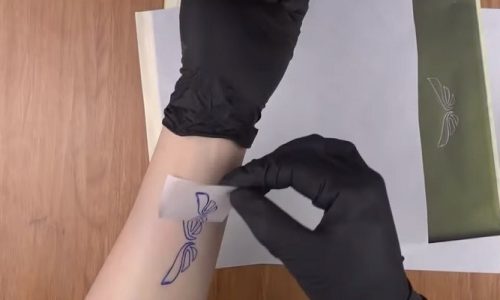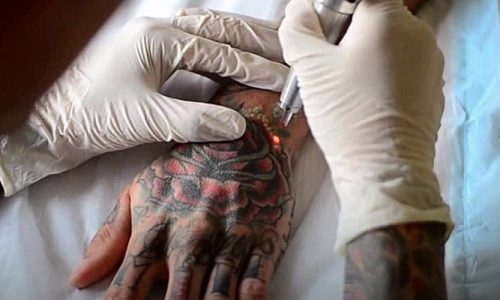Last Updated on June 18, 2025 by Jaclyn A. Neeley
Getting tattoos before surgery is not recommended as it can increase the risk of damaging the skin tissues and complications with the surgery itself. It is best to wait for the tattoo to heal before undergoing any surgical procedures.
Timing is crucial to ensure proper healing and minimize any potential risks.
Risks Of Getting Tattoos Before Surgery
Getting tattoos before surgery can increase the risk of complications. The tattooed area may be further damaged, and it can slow down the healing process of surgical wounds. It’s important to weigh the potential risks before making a decision.
Increased Risk Of Skin Damage
Getting tattoos before surgery can lead to an increased risk of skin damage. When you get a tattoo, the process involves puncturing the skin with a needle to inject ink into the deeper layers. This can cause trauma to the skin and create an open wound. If you undergo surgery on or near the tattooed area, it can further damage the skin tissues, potentially leading to complications during the procedure. The delicate balance of the skin’s structure can be disturbed, which may result in poor wound healing and affect the overall outcome of the surgery.
Complications With The Surgery
Having tattoos before surgery can also lead to complications with the procedure itself. The tattooed area might need to be cut or incised during the surgery, and this can disrupt the appearance of the tattoo. Surgeons typically try to avoid cutting through tattoos if possible, as it can affect the overall aesthetic and may complicate the healing process. Additionally, the tattooed skin may have different characteristics than normal skin, such as reduced elasticity or compromised blood flow, which can pose challenges to the surgical procedure. These complications can prolong the surgery and potentially increase the risk of adverse outcomes.
Slower Healing Processes
When you have a tattoo, the healing process involves the formation of new skin over the tattooed area. This process requires time, proper blood flow, and healthy skin cells. However, if you get a tattoo before surgery, the healing processes can be slower and more complicated. Surgery creates additional trauma to the skin, and the body will naturally prioritize healing the surgical wounds over the tattooed area. Consequently, the tattooed skin might not receive sufficient blood supply and nutrients, hampering the healing process. This slower healing can increase the risk of infections, scarring, and other complications following surgery.
While it may be tempting to get tattoos before surgery, it is important to consider the potential risks. Tattooing before surgery can increase the risk of skin damage, lead to complications with the surgical procedure, and slow down the healing processes. It is advisable to consult with your surgeon and weigh the potential risks before making a decision. Ultimately, prioritizing your health and ensuring a successful surgery should be the primary concern.
Tattoos Interfering With Medical Procedures
When it comes to getting tattoos before surgery, one concern that may arise is whether tattoos can interfere with medical procedures. While getting a tattoo before surgery is generally not recommended, it is important to understand the potential risks and complications that tattoos can pose during medical procedures. In particular, tattoos have been known to interfere with certain types of medical scans, such as MRI scans, and can occasionally lead to rare complications. In this article, we will explore two specific areas where tattoos can interfere with medical procedures: interference with MRI scans and rare complications.
Interference With Mri Scans
One of the major concerns with tattoos before surgery is their potential interference with MRI scans. MRI (Magnetic Resonance Imaging) is a diagnostic imaging technique that uses powerful magnets and radio waves to create detailed images of the body’s structures. The presence of metallic substances in the body, such as tattoo ink containing iron oxide, can cause artifacts on MRI images, making it difficult for healthcare professionals to accurately diagnose and evaluate certain conditions.
It is important to note that not all tattoos will cause interference with MRI scans. The extent of interference depends on various factors, including the size, location, and composition of the tattoo. In general, tattoos that contain metallic pigments or inks with high iron oxide content are more likely to cause interference. If you have a tattoo and need to undergo an MRI scan, it is essential to inform your healthcare provider beforehand. They will evaluate the tattoo and provide necessary instructions or alternatives to ensure accurate imaging and diagnosis.
Rare Complications
In addition to potential interference with MRI scans, there have been rare cases of complications related to tattoos during medical procedures. While these complications are uncommon, it is important to be aware of them. For example, during surgeries, healthcare professionals usually try to avoid cutting directly through tattoos if possible. This is primarily to preserve the appearance of the tattoo and prevent any potential complications that could arise from disrupting the tattooed skin.
Moreover, recent tattoos or tattoos that are still in the healing phase before surgery can be more susceptible to complications. Open wounds from fresh tattoos can increase the risk of infections and delay the healing process. Therefore, it is generally recommended to avoid getting tattoos in the immediate period leading up to surgery to minimize these risks.
While it is technically possible to get tattoos before surgery, it is important to weigh the potential risks and complications. Tattoos can interfere with MRI scans and occasionally lead to rare complications during medical procedures. If you are considering getting a tattoo before surgery, it is crucial to consult with your healthcare provider and follow their advice to ensure the best possible outcomes.
Surgeon’s Approach To Tattoos
Avoiding Cutting Through Tattoos If Possible
When it comes to performing surgeries, surgeons typically try to avoid cutting through tattoos if possible. Cutting through a tattoo can affect the appearance of the tattoo itself, and may complicate the healing process. Surgeons understand the importance of preserving the integrity of the tattoo, especially if it holds personal or emotional significance to the patient. By avoiding cutting through tattoos, surgeons aim to provide the best possible outcome for both the patient’s health and the aesthetics of their tattoo.
Consideration For Appearance And Healing Process
In addition to avoiding cutting through tattoos, surgeons also take into consideration the appearance of the tattoo and its impact on the healing process. Tattoos are a form of self-expression, and patients may have invested time, effort, and emotional attachment into their body art. Surgeons respect this and understand the significance of preserving the tattoo’s integrity during the surgical process. By minimizing disruption to the tattoo, surgeons help ensure that the healing process is not compromised and that the final result aligns with the patient’s expectations.
Surgeons approach tattoos in a caring and respectful manner. They aim to avoid cutting through tattoos whenever possible, considering the importance of appearance and the healing process. By doing so, surgeons prioritize both the patient’s physical health and the preservation of their tattoos.
Best Timing For Tattoos And Plastic Surgery
It is not recommended to get tattoos before surgery as it can increase the risk of complications and interfere with the healing process. It is best to wait until after the surgery to get a tattoo.
Ideal Time For Tattoos Before Plastic Surgery
When it comes to considering getting a tattoo before undergoing plastic surgery, timing is crucial. The ideal time to get a tattoo is before any plastic surgery procedures are performed. By getting your tattoo before surgery, you reduce the risk of complications and ensure a smoother healing process.
Waiting Until Surgery Is Sufficiently Healed
If you choose to get a tattoo after having plastic surgery, it’s important to wait until the surgical site is sufficiently healed. Tattoos on fresh surgical wounds can lead to further damage to your skin tissues, opening up wounds and impeding the healing process. Therefore, it’s advisable to wait until your surgeon confirms that the area is fully healed before considering a tattoo.
Ensuring Each Heading Adheres To Html Syntax
When creating engaging content for your readers, it’s essential to follow proper HTML syntax for headings. By using H3 tags correctly, your content becomes more organized and easier to read for both humans and search engines.
Ideal Time For Tattoos Before Plastic Surgery
The ideal time to get your tattoo is before any plastic surgery procedures are performed. If you get your tattoo after having surgery, you risk having it interfere with the healing process and potentially cause complications.
Waiting Until Surgery Is Sufficiently Healed
Waiting until your surgical site is fully healed before getting a tattoo is crucial. This ensures that your skin has adequately recovered and reduces the risk of complications or damage to the surgical area.
| Benefits of getting tattoos before plastic surgery |
|---|
|
While getting a tattoo before surgery is a personal decision, it is generally recommended to do so before undergoing any plastic surgery procedures. By doing this, you minimize the risk of complications and ensure a smooth recovery process. However, if you choose to get a tattoo after surgery, make sure to wait until the surgical site has sufficiently healed before proceeding. Always consult with your surgeon to ensure the best timing and to address any concerns you may have.
Safety Measures Before Surgery And Tattoos
While it is not recommended, you can get tattoos before surgery, but it’s best to do so with small or medium-sized tattoos in different areas to allow for proper healing. However, it’s essential to consider the potential risks and consult with your surgeon before making a decision.
Avoiding Tattoos Within Two Weeks Of Surgery
When it comes to getting tattoos before surgery, it is crucial to consider safety measures. One important guideline is to avoid getting a tattoo within two weeks of your scheduled surgery. This guideline is put in place to reduce the risk of complications and ensure a smooth healing process.
During the tattooing process, the skin is punctured, creating an open wound. This wound needs time to heal properly before undergoing any surgical procedures. Getting a tattoo too close to your surgery date increases the risk of infection and can slow down the healing process of both the tattoo and the surgical incisions.
It is important to remember that surgery is a major medical procedure that involves cutting through the skin and underlying tissues. Any disruption or potential infection in the tattooed area can have serious consequences for both the tattoo and the surgical outcome.
Reducing The Risk Of Preoperative Infection
Another crucial safety measure before surgery and tattoos is reducing the risk of preoperative infection. Surgical sites need to be kept clean and free from any potential sources of infection, including fresh tattoos.
Inform your healthcare provider about any recent tattoos you may have. This will allow them to evaluate the situation and make appropriate recommendations to ensure your safety and the success of the surgery. They may advise postponing the surgery until the tattoo has fully healed or take additional precautions to minimize the risk of infection.
It is important to note that the risk of infection is not limited to the tattooed area alone. Bacteria or pathogens from the tattooed skin can spread to other parts of the body during surgery, increasing the risk of postoperative complications. By adhering to the safety measure of avoiding tattoos within two weeks of surgery, you can significantly reduce the risk of preoperative infection and optimize your surgical outcome.
Frequently Asked Questions On Can You Get Tattoos Before Surgery?
Is It Safe To Have Surgery After Getting A Tattoo?
Getting surgery after getting a tattoo is not recommended. It can damage your skin tissues and lead to complications with the surgery itself. It is best to wait until the tattoo is fully healed before undergoing surgery.
Do Tattoos Interfere With Medical Procedures?
Getting surgery on a recently tattooed area can increase the risk of skin damage and complications. It may also slow down the healing process. However, tattoos have been known to interfere with certain medical scans like MRIs. So, it is best to consult with your healthcare provider before undergoing any medical procedure if you have tattoos.
Is It Safe To Get A Tattoo Before Knee Surgery?
It is not recommended to get a tattoo before knee surgery as it can increase the risk of complications and slow down the healing process. It is best to wait until after the surgery to get a tattoo.
Do Surgeons Cut Around Tattoos?
Surgeons try to avoid cutting through tattoos if possible as it can affect the appearance of the tattoo and complicate the healing process.
Can You Get A Tattoo Before Surgery?
Yes, you can get a tattoo before surgery, but it is not recommended. It is important to weigh the potential risks and take necessary precautions.
Is It Safe To Have Surgery After Getting A Tattoo?
Getting surgery on an area that has recently had a tattoo increases the risk of further damaging your skin tissues. It may also lead to complications with the surgery itself.
Conclusion
Getting a tattoo before surgery is not recommended due to the potential risks involved. It can increase the chances of damaging the skin tissues and lead to complications during the surgery itself. Surgeons also try to avoid cutting through tattoos to preserve their appearance and aid in the healing process.
While it ultimately comes down to personal choice, it is important to carefully weigh the potential risks before deciding to get a tattoo before surgery.







